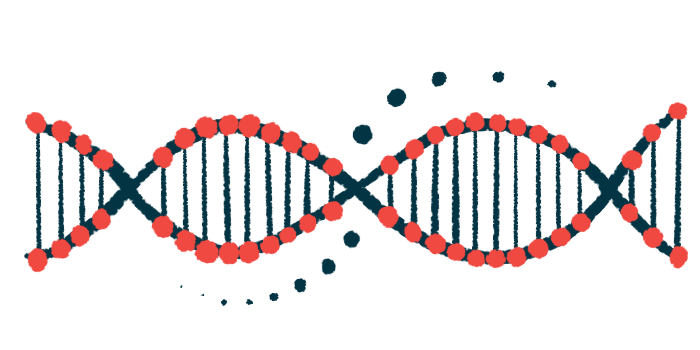Variants in SERPINA1 gene may increase risk of death in AAV
Sixfold higher mortality risk seen for patients with polymorphisms: Study
Written by |

People with ANCA-associated vasculitis (AAV) who carry certain variants in SERPINA1 — a gene that’s been previously linked to the autoimmune disease — may have a six times higher risk of death than those without such variants.
That’s according to new data from a single-center study in Brazil, in which researchers specifically looked at two SERPINA1 polymorphisms, or versions of a gene that occur within populations.
Patients carrying either of these two specific variants had higher mortality, living about a decade less than those without these polymorphisms, the data showed.
These findings suggest that these SERPINA1 polymorphisms are “poor prognostic factors in ANCA-associated vasculitis,” the researchers wrote.
The study, “Polymorphisms of the SERPINA1 gene are associated with higher mortality in a Brazilian cohort of ANCA-associated vasculitis patients,” was published in the journal Clinics.
Investigating survival outcomes in patients in Brazil
AAV is a rare autoimmune condition that occurs when self-reactive antibodies prompt immune cells called neutrophils to cause damaging inflammation to neighboring small blood vessels. This results in a range of symptoms, which can manifest anywhere in the body.
Previous studies have suggested that certain polymorphisms in the SERPINA1 gene — including the rs28929474 variant — appear more frequently in people with certain forms of AAV compared with healthy individuals.
SERPINA1 provides instructions for producing a type of serpin or serine protease inhibitor that blocks the proteinase 3, or PR3, protein. PR3 is found inside neutrophils, and is one of the main targets of the self-reactive antibodies that cause AAV.
It is thought that certain polymorphisms in the SERPINA1 gene may result in higher levels of PR3 inside neutrophils, likely enhancing AAV-driving autoimmune responses.
However, “there is a scarcity of data regarding the influence of these [polymorphisms] on the prognosis of affected individuals,” the researchers wrote.
To learn more, the team, from the Universidade de São Paulo, investigated whether carrying one of two SERPINA1 polymorphisms — specifically rs28929474 and rs7151526 — affected the survival of AAV patients.
The study involved 115 adults with a diagnosis of AAV who were followed for a median of five years (range, two-12 years) in a single center in Brazil. The participants comprised 72 men and 43 women, and slightly more than half (54.7%) were white individuals. The remaining 45.3% of patients were Black individuals.
Regarding AAV types, the most common was granulomatosis with polyangiitis, or GPA, affecting 65.2% of patients. Eosinophilic granulomatosis with polyangiitis, or EGPA, and microscopic polyangiitis each had been diagnosed in 17.4% of patients.
The rs28929474 and rs7151526 polymorphisms were significantly more frequent among Black patients, those younger than 50, and those with a GPA diagnosis. The researchers noted that there were no cases of EGPA, the rarest AAV type, among carriers of these variants.
The blood levels of alpha-1 antitrypsin, the serpin encoded by the SERPINA1 gene, were significantly lower relative to non-carriers in patients carrying two copies of either polymorphism (by about six times) and those carrying only one copy (by about 1.5 times).
SERPINA1 polymorphisms found to be strongest risk factor for death
During the follow-up period, 11 patients (9.6%) died, with infection being the most common cause of death (45.6%), followed by disease activity (36.4%), and cardiovascular disease (9%).
Statistical analyses showed that carrying a SERPINA1 polymorphism was the strongest risk factor for death, being significantly associated with a six times higher risk.
Patients carrying none of these variants lived a mean of 68 years, while those carrying rs28929474 lived a mean of 54.9 years and those with rs7151526 lived a mean of 57.4 years.
This study is the first to demonstrate an association between SERPINA1 gene [polymorphisms, or gene variants] (rs7151526 and rs28929474) and higher mortality in a Brazilian multiethnic [group] of AAV patients. … The presence of these [polymorphisms] was also more frequent in younger individuals ([younger than]50 years) and Black patients.
No significant survival differences were found between AAV types, ANCA types, or ethnicities, according to the researchers.
“This study is the first to demonstrate an association between SERPINA1 gene [polymorphisms] (rs7151526 and rs28929474) and higher mortality in a Brazilian multiethnic [group] of AAV patients,” the team wrote.
“The presence of these [polymorphisms] was also more frequent in younger individuals ([younger than]50 years) and Black patients,” the researchers added.
According to the researchers, the findings also suggest that measuring alpha-1 antitrypsin in the blood could “be used as a screening method” in people with AAV, “especially in young patients.” The team noted that alpha-1 antitrypsin levels are usually higher in people with active AAV.







